
This is what a speculative writer is like — extreme! That’s not Emily. At least I don’t think it’s Emily.
There’s Still Time to Enter the Giveaway! Deadline is September 9th!
There is fiction writing that takes chances and creates beautiful story worlds — sweet communities with quirky and endearing characters. Or intense, suspenseful environments that keep the reader on edge.
Then there is speculative fiction*, specifically sci-fi and fantasy where story worlds are otherworldly. I liken these genres to extreme writing. You know what I mean? There is black-diamond snow skiing, then there is extreme snow skiing. Extreme. Where a skier jumps from a helicopter to a peak you wouldn’t climb, then skies down it. That’s what I think of this month’s author, award-winning fantasy writer, Emily H. Jeffries. She’s an extreme writer.
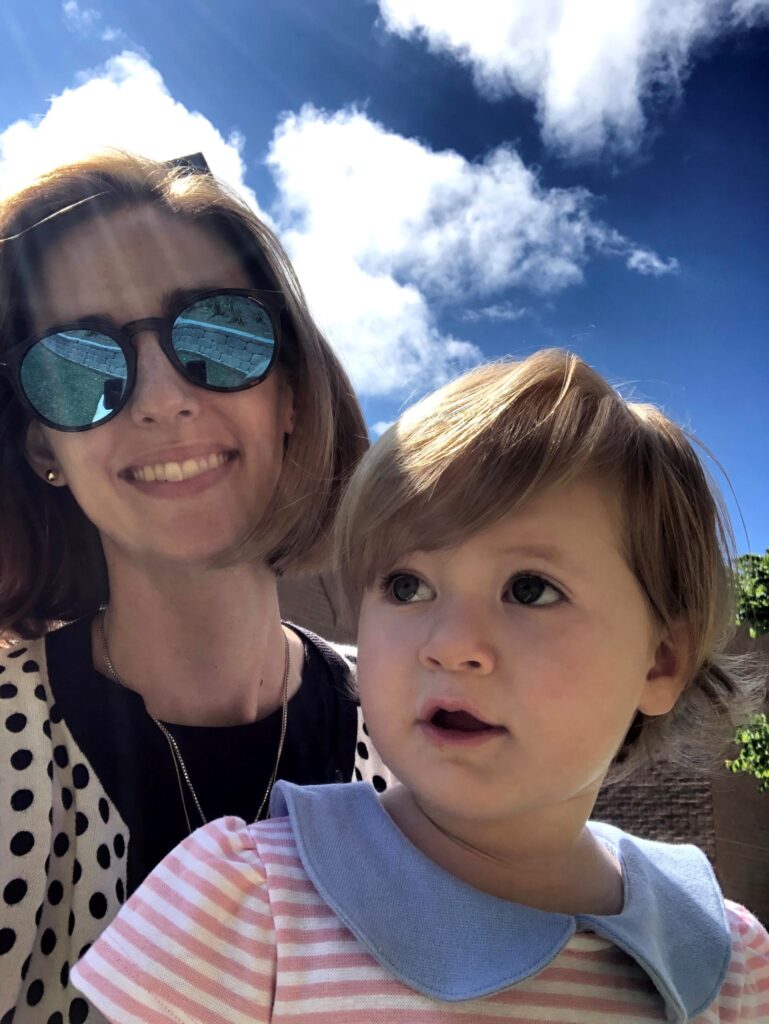
Realm Makers Award Winner for Best Debut Novel, Emily H. Jeffries is a theology teacher and speaker with bachelors degrees in drama and religious studies from the University of Virginia and a master’s in sacred theology from the Dominican House of Studies in Washington, DC, where most of her classmates were wizards—that is, friars. She currently lives in Atlanta, Georgia, with her husband, baby daughter, Aussie-doodle, and herbs.
Uh huh. From her bio you might think our Emily is an ordinary scholar, but read on as we learn more about this talented and highly imaginative author.
What was your inspiration for writing?
I started to write a fairytale as a creative outlet after graduating from college. It was after teaching middle school and high school that I seriously began to think about finishing that manuscript. My health was getting worse in response to the demands of teaching (endometriosis and related complications), which forced me to consider quitting working full time. However, I was developing a deep love for adolescent and pre-adolescent youngsters, and wanted to stay connected to them. What finally pushed me to take up the pen, so to speak, was an increasing horror at the types of stories these precious kiddos were consuming!
So many of us entered the writing world to provide wholesome stories our children and young adults would find engaging.
How has Christian fiction impacted you personally?
To be honest, I was new to the world of contemporary Christian fiction publishing when I started to pursue an agent back in 2014. I was initially looking at general market, but became frustrated with the so-called values of the big time literary agents. I started to look at the Christian market because that’s the worldview I am writing from, and the themes of Fyrian’s Fire (and all my unpublished work) are distinctly Christian. I’m ashamed to say, I rarely recognize the names of the ACFW celebs, haha! Though I am a fan of Melanie Dickerson. I’d love to have a career like hers.
Well, if you had to chose one ACFW “celeb,” Melanie is a great one.
How has being published been a fulfillment of your dreams?
In the sense that now I have something concrete to actually share with people. Having a complete project to offer really does wonders, I think. And I also loved the collaborative process of working with a design team, an editing team, etc. That kind of gathering of creatives, all bringing their expertise to a common project really feeds my soul. I think because of my background in theatre.
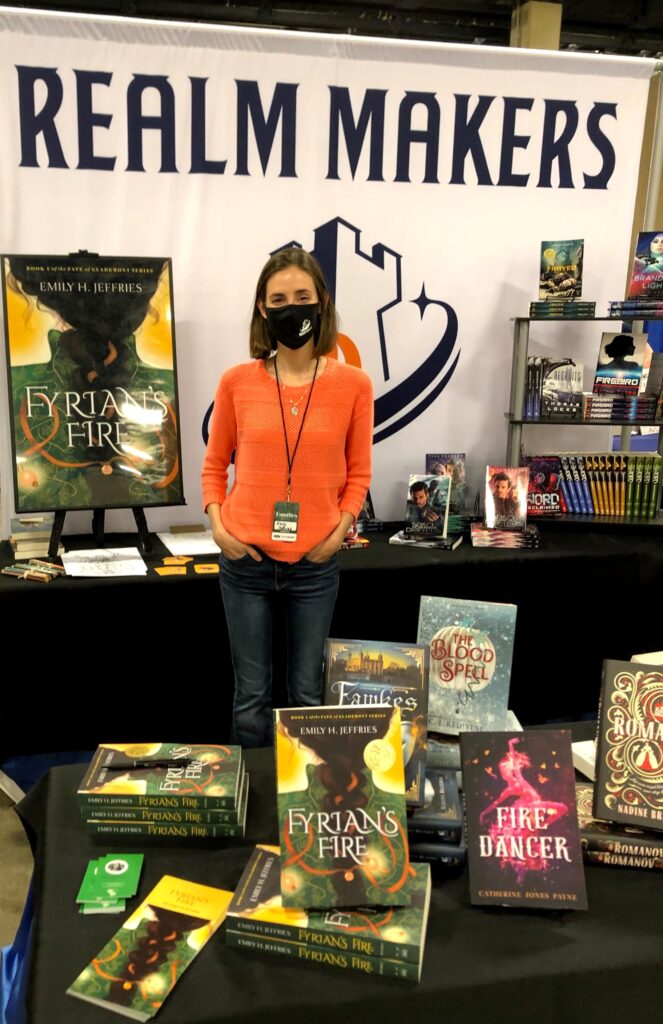
Emily was Keeper of the Realm–Realm Makers, that is — During the Teach Them Diligently Conference.
What a great analogy — comparing publishing to theatre. I know an author who is equally invested in both writing and the theatre.
What did you read as a child?
As a fantasy writer, this whimsical list will not surprise you. In fact, to this day, my favorite reads are children’s lit. Anne of Green Gables is always at the top, for me, as well as The Secret Garden, Peter Pan, The Chronicles of Narnia (Voyage of the Dawntreader especially), Dealing with Dragons, the Redwall series (which heavily influenced Fyrian’s Fire) … I have a more extensive list of favorites on my website.
I began the Redwall series, but got lost almost immediately. Nevertheless, I can see similarities with your book, especially with the heroism of the animals.
Who are your favorite authors to read and why?
C.S. Lewis is maybe my favorite author. He has this quality that is unmatched where, he is both profoundly insightful and elegantly straightforward at the same time. The simplest illustration or statement of his never fails to blow my mind. Besides Lewis and the authors I mentioned already, I so admire the writings of Louisa May Alcott. She successfully wrote moral tales without a hint of inauthenticity or preachiness, and that is an exceedingly rare gift.
I love C.S. Lewis. I’ve read biographies about him, and in so many ways he seemed so sedate and dry. You just never know what is going on inside a person’s imagination.
Do you have any strange writing habits?
It’s hard to know, since one mostly writes in isolation. Ha! I can’t write while listening to any music with lyrics, normally. And at the bottom of a new chapter document, I’ll have an extremely embarrassing synopsis of what I plan for the chapter. They usually read something like, “Tess is all, omg Tynaiv you scoundrel! And then they walk around but Tynaiv’s being all shy and then boom arrows come flying in …” There are a lot of exclamation points and the word “like” or very refined phrases like, “say what?”
I literally laughed out loud with each chapter’s editorial comments. But, what a great idea!
Do you have any unusual research habits for your books?
I often wonder how fiction has been affected since the dawn of Google. Obviously, that is where I go first for most of my research, but sometimes I worry that my sources aren’t diverse enough in the sense that they don’t paint a full picture. So, I always try to tap into my lived experience to add depth. As an example, much of the landscape of Glademont is inspired by southern Alaska. So, whenever I am painting flora or fauna in the scene, I’ll look up native species to that area. But I’ll also just picture some similar plants or animals that made an impression on me, and lean on that experience more so than the images or descriptions I’m pulling up on Wikipedia.
Interesting. Alaska? We’ll have to discuss this another time.
Which of your characters has really stretched you as a writer?
My protagonist, Tess! While writing Fyrian’s Fire, Tess transformed from a girl who was (in a sense) supposed to be me into her own character. So, while she was taking on her own personality and motivations, I was having to parse out where we were similar and where our dispositions deviated from each other. I also, for some reason, just have a deep-seated aversion to interior dialogue. I have a very low tolerance for characters going on and on in their heads in fiction, and editors were always asking for more of this from Tess. Ha! So, it was tough to strike that balance.
Ah, yes! The deep POV — Point of View. My editor was very frustrated with my lack of deep POV.

Who is your most favorite character?
My husband is all about the villains! His favorite Disney character is Ursula. It cracks me up. I like heroines, but I like quirky sidekicks the best. That role is often missing in YA. And it’s a matter of taste, but to me an adventure without some colorful characters is taking itself too seriously and straining my emotions. There’s just something about the Dobbys and the R2D2s of the story world that brings everyone such delight. I love that.
YES! Great point! Several of my “sidekicks” were critical to the main character’s story arc. And who doesn’t love R2D2!
What is the story behind Fyrian’s Fire?

At first, FF was a manuscript called “The Forgotten Queen” and it was about what a young woman might do if she made a terrible mistake and lost her true love as a result. But in that iteration, the prince was too perfect and wholly unlikable. Then, once I started teaching and got to know dozens of students and their struggles, I started preaching the same thing over and over: resist the dictatorship of your passions.
All the YA content they were consuming had this message of, “I feel like doing this; therefore, it is the right thing to do.” And that is the unhealthiest mantra I think I have ever heard! I mean it’s hedonism, isn’t it? And that leads to misery.
[SPOILER ALERT] So that is a major theme of this book, where Tess allows her emotions to guide her and that leads to a terrible mistake, and then she begins to learn about sacrifice and duty through her adventure.
Another theme that emerged as I was writing was one of adoration vs. obscurity. This became a really central lesson of FF, where Tess, being a young, talented girl, feels she is owed the admiration of her peers and even the entire country! But then, when she actually does something amazing and heroic, she cannot be recognized for her deeds. This is something so foreign to us in an age of social media. I personally struggle with it all the time.
Whoa. You are so right. With social media and YouTube we have created an environment of imitation fame and acceptance. Very important theme for young people — and adults.
What is something God taught you while you wrote your featured book?
See above. But also, I learned a lot about being undeserving. I remember so clearly that when my husband agreed to take the leap and self-publish, I shared with my spiritual mentor that I just felt I didn’t deserve this gift. And she said, “of course you don’t!” and that has completely reshaped my spiritual life.
It is difficult to accept undeserving love, even though our very faith is based on the undeserving love of our Heavenly Father to send His Son to die for us.
What is one of your favorite quotes from FF and why do you love it?
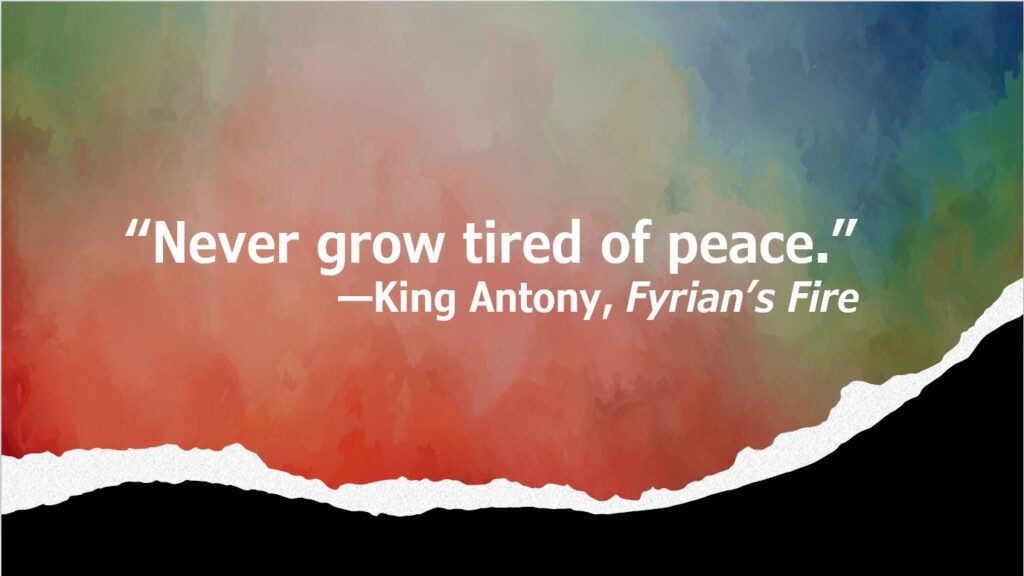
When I sign the book for people, I’ll usually quote King Antony when he says “Never grow tired of peace.” It’s actually from a chapter that I wrote in the very last round of edits. It’s a flashback with a young Prince Linden and his late father, whom he both admired and was also a little frustrated with.
I think among young Americans there is a restlessness connected with living in such a prosperous time. Because many of them feel bored or wish to be seen as the most special, an obsession with victimhood has really taken hold.
People in countries that are in true crisis do not have the luxury of feeling special because they are undergoing persecution. Unfortunately, some in our country have tapped into this unhealthy obsession with victimization and capitalized on it. And now we are moving toward being a country in actual crisis.
At any rate, being human means that you don’t know what you’ve got until it’s gone, and I think peace is a very major gift taken for granted in recent generations. In fact, in some cases, it is despised.
Very wise. I’ll be chewing on that for a while.
What are you working on now?
Right now, I am drafting book two in the Glademont trilogy. Fingers crossed that I can get it ready for editors before baby number two comes in December. Yikes!
I’m also working on a world-building workbook to offer on my website. I’m very excited about that. It’s a one-stop online notebook with prompts and helpful categories, so that if you are writing speculative fiction, you have one place to keep track of your landscape, costume, magic system, languages, and so forth. It’s what I wish I had when I started creating the world of Glademont!
No questions there will be some spec writers chomping at the bit for that workbook and readers for the second installment.
What is the best writing tip you ever received?
Step away from the manuscript! I actually don’t remember if this was a tip I received or something I just learned from trial and error, but I think a big mistake a lot of beginner writers make is they stay too deep in their manuscripts from one phase to the next.
Like they’ll write “the end” on a draft and the next day start ripping the manuscript apart with edits.
I think the period of time you spend away from a manuscript is so important. There is so much you don’t see when you are too close to a project. Fresh eyes are paramount. So, one of my favorite parts of the writing process is actually stepping away from the work to do something totally different and just for me.
Very wise, my Padawan learner. Very wise.
What is the least helpful writing tip you’ve ever received?
If I had a nickel for every time someone told me about a famous writer who wakes up at 4am and writes for two hours before the kids get up or they go to work or whatever … I’d be driving a Porsche! I meant, to be fair, I am just not a gal with a hardy constitution. I have always had crazy low B12 levels and have had many health issues, as I’ve mentioned.
So “just don’t sleep” has never been an even sort of helpful nugget of advice for me. I am in awe of people who can get up at all hours and be crazy productive, but that will just never be me and that’s okay. Not everyone’s physiologies can handle the same things. I just have to accept that I am a slow writer.
Maybe one day I will! Ha!
LOL! I have periods where I can get up in the wee hours and write. But those days — or nights — grow less as I age.

What do you hope readers know about you and your books?
Hmm … I just hope the right people discover my books. People who would love them. I don’t think a gritty science fiction enthusiast should waste his time reading Fyrian’s Fire. He will probably be pretty disappointed! But I do know there are a lot of people like me who crave a brand of fiction that is fun and sometimes hilarious and sometimes heart-wrenching and overall hopeful and beautiful.
Hopefully my writing is going down that road, and hopefully readers can sense that that is what I’m striving for. John Paul II said life with Jesus is a beautiful adventure. I am trying to explore that idea with my writing. Looking at the interior life as an adventure transforms your perspective entirely.
That’s so important. Whatever we write, it is for a certain reader and we pray that the reader and book find each other.
What is your “Pound on the table passion?“
This may seem like a strange one, but [the saying] “Boys will be boys” brings out the beast in me. I know people say it flippantly, mostly, but I think it speaks to a real and dangerous mindset that is a poison to society.
I do not subscribe to the idea that boys have to “sow wild oats” in their youth, that it’s healthy and natural for them to have no control over themselves, that they can’t be expected to behave themselves, etc. I think that careless attitude leads to a crisis among both men and women.
Boys certainly need physical outlets, ways to work hard that also appeal to a more adventurous spirit, etc. But boys also need to learn prudence and temperance at a young age, just as much as girls do. I think this is a subject that Louisa May Alcott handles beautifully in her books.
Preach it, sister! This is why I love teaching and living the wisdom of Proverbs. There is so much practical life applications, especially for boys.
______
The September Author Highlight Giveaway!
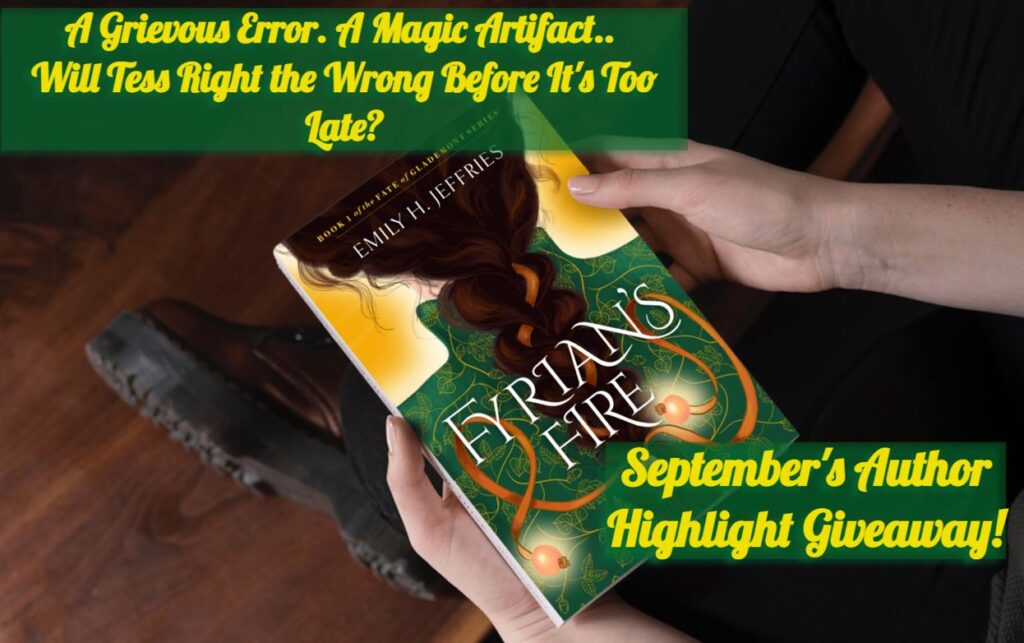
Emily has graciously offered a Magical giveaway for this month’s winner! An autographed copy of Fyrian’s Fire. To enter, post a comment below about the interview. On Friday, September 10th, one entry will be randomly selected.
And if you haven’t already, I hope you’ll subscribe to my monthly newsletter below — I have two special surprises for you. And, you’ll have another entry into the giveaway!
One Winner! And it could be you! Be sure to tell your friends and family to come on by and enter! Drawing takes place on Friday, September 10th!
NOTE: WANT TO INCREASE YOUR CHANCES OF WINNING THIS INCREDIBLE GIVEAWAY?
Check out my YouTube Author Highlight interview with Emily. In the video interview she will answer different questions, and provide some fun insights — especially for writers. By Liking and Commenting you will have one more entry. Sharing the video, another entry. Subscribe, and you have TWO entries for the chance to win.
Remember the deadline is September 9th!
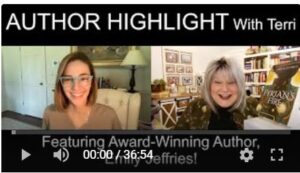
That means, my friends, if you comment and subscribe -– or are already a subscriber -– to my blog, then watch the video and LIKE, SHARE, and COMMENT, then Subscribe to my YouTube Channel, your name will be entered SIX TIMES!
Be sure to tell your friends! See you there!
Thanks so much for stopping by. I hope you enjoyed getting to know my new friend Emily and her debut book. Next month’s Author Highlight is award-winning author, Patti Smith Hall! God Bless and Keep Reading!
_____
*Speculative Fiction is an umbrella genre encompassing narrative fiction with supernatural or futuristic elements. This includes, but is not limited to, science fiction, fantasy, superhero fiction, science fantasy, horror, utopian and dystopian fiction, supernatural fiction as well as combinations thereof.

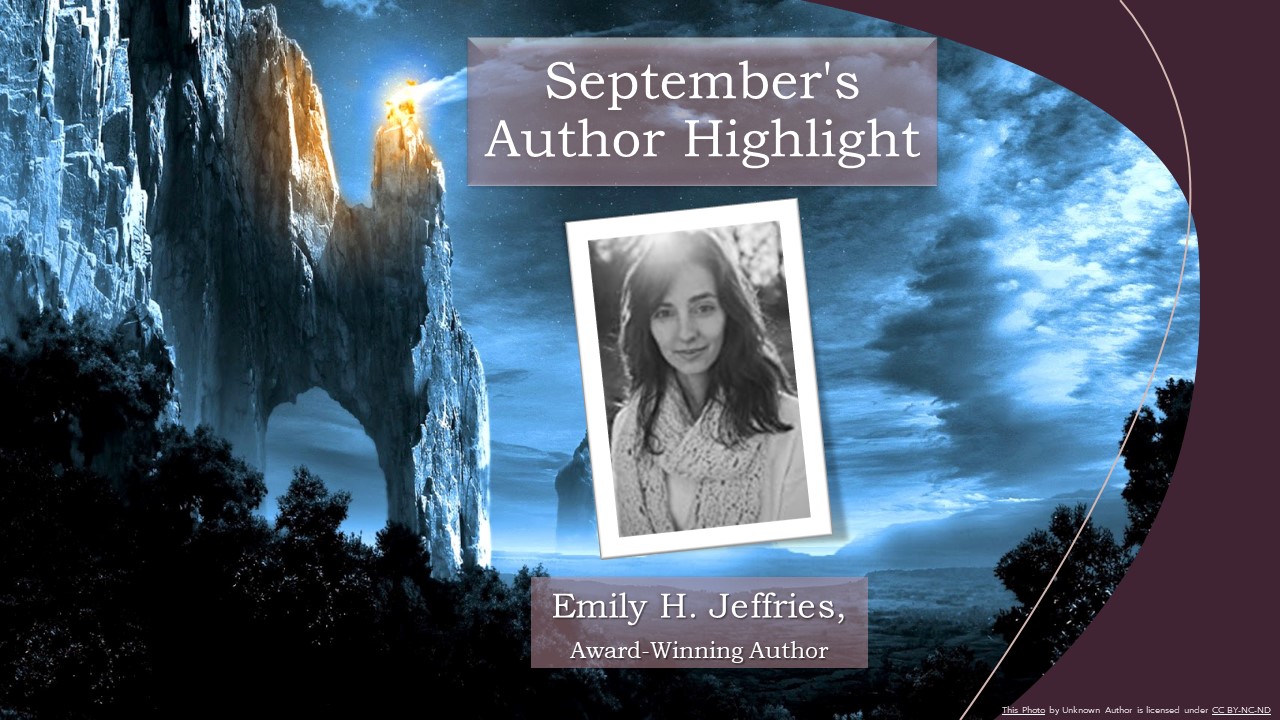
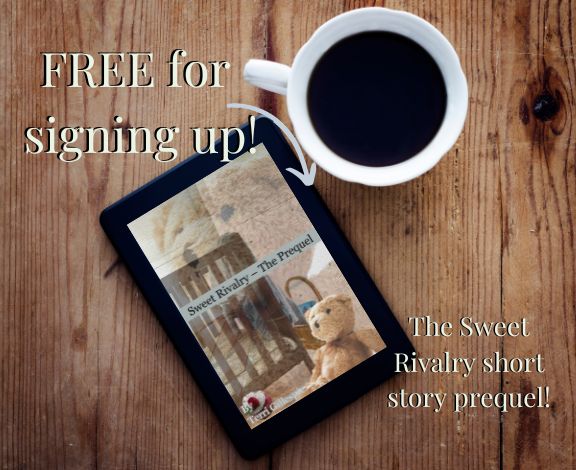

So fun!
Thanks for stopping by, Breny! Another entry! Yay!
I loved this interview and I can’t wait to read this book now! Wow! I’m so glad to learn about this author.
I think you’re going to love Emily’s story, Julie! Thanks for stopping by for the interview. Be sure to watch the YouTube show, Emily and I talk about some great writing tips! You’ve been entered into the giveaway!